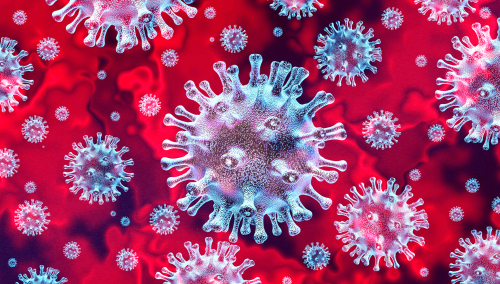Some people who were infected with COVID-19 experience ongoing symptoms during their recovery. As part of our highly specialised team of Physiotherapists and healthcare professionals at The London Clinic, we are sharing a round-up of the most common issues patients face and the support that is available.

Respiratory symptoms
By Rene Maree, Advanced Physiotherapy Practitioner
The respiratory system is the organs and other parts in your body involved in breathing, which is one of the main areas that COVID-19 targets.
Respiratory symptoms following infection from COVID-19 could develop due to various causes, such as changes in a person’s breathing pattern, weak respiratory (breathing) muscles, nasal and upper airway disorders, and pre-existing health conditions.
The British Thoracic Society (BTS) recommends a referral to Respiratory Physiotherapy if a change in a person’s breathing pattern is suspected following a COVID-19 infection.
Respiratory Physiotherapists work with patients in a number of ways to aid recovery from COVID-19.
If a patient’s breathing pattern has changed, either at rest or when talking or exercising, Respiratory Physiotherapists can help patients to retrain how they breathe.
Respiratory Physiotherapists can support with upper airway disorders and strengthening weak breathing muscles.
They can help patients manage their fatigue with individually tailored advice on activity pacing, fatigue management and graded exercise programmes.
As the solution depends on the symptoms and circumstances of the individual, bespoke treatment plans are tailored depending on each patient’s needs.
Rene Maree
Musculoskeletal symptoms
By Ruth Ashton, Lead Outpatient Physiotherapist
Musculoskeletal symptoms of fatigue, arthralgia (joint pain) and myalgia (muscle pain) have been reported in patients suffering from COVID-19.
These symptoms may arise due to a number of reasons, including the body’s inflammatory and/or immune reaction to the virus or the side effects of using medications to treat the virus, such as steroids.
They can also be a response to deconditioning, which is where the body adapts to a less demanding lifestyle, such as following a period of bed rest while recovering from an illness such as COVID-19.
Physiotherapy can have a key role to play in rehabilitating and managing the musculoskeletal symptoms of COVID-19. Once more serious conditions affecting the heart, lungs, kidneys and brain have been ruled out, exercise can be undertaken with our specialised team to target strength and endurance and support with other related musculoskeletal issues.
This is made possible by a variety of state-of-the-art equipment which we are home to at The London Clinic. Land-based exercise can be undertaken in our newly refurbished Physiotherapy gym, which features:
- Barbells and free weights
- TRX suspension training
- Keiser pulley system and exercise bike
- Cross-trainer
- Alter-G treadmill
- Biodex™ system.
Aquatic therapy and individually tailored exercise programmes occur in our on-site pool. Exercising in water can be greatly beneficial for some patients as buoyancy reduces pressure on painful joints, the warmth of the water can relax painful muscles and improve circulation, while water provides resistance to strengthen weak muscles.
If you would like to make a Physiotherapy appointment for respiratory or musculoskeletal symptom management please contact us on +44 020 7616 7643 or physio@thelondonclinic.co.uk.
Ruth Ashton
Nutrition
By Scott Marsden, Clinical Lead Dietician
In the more severe cases of COVID-19 infection and hospitalisation, malnutrition – leading to significant lean body mass (LBM) depletion – is very common.
As we learn more about the virus and patients’ recovery from it, we are also seeing gastrointestinal problems, fatigue and poor appetite appear more and more.
These symptoms risk having a further negative impact on the long-term nutritional status and rehabilitation of patients. It is vital that optimal nutrition support is achieved, particularly once a patient has been discharged from hospital.
The London Clinic can support in ensuring all post COVID-19 patients have access to an individualised nutrition support treatment plan, which is overseen by a registered Dietician.
If you would like to make an appointment, please contact the Dietetics team on +44 020 7616 7643.
Scott Marsden
Psychological issues
By Amelie Bobsien, Psychologist
Besides significant ongoing physical health problems, many post COVID-19 patients experience psychological struggles as a normal response following this experience.
Common post-viral effects on our minds are:
- Fear and anxiety (even when we might now be safe and no longer in danger)
- Low mood
- Feeling irritable and frustrated
- Problems with memory, attention and concentration.
Some people experience problems with sleep and also report nightmares and flashbacks.
These normal psychological reactions can complicate recovery if not attended to but can also be addressed successfully through appropriate psychological support. The British Psychological Society recommends an early follow-up and a structured rehabilitation package that includes specialist psychological support.
Further information
At The London Clinic, we are committed to providing the best care and support for our patients. No one could have predicted how this year would transpire – and our hospital remains open, safe and ready for our patients.
If you are experiencing any of the symptoms mentioned in this article, it is recommended you visit your GP or Physician.
If you would like to book an appointment with us, please speak to one of our Appointments team on: 020 7616 7693 or request an appointment via our contact form.





